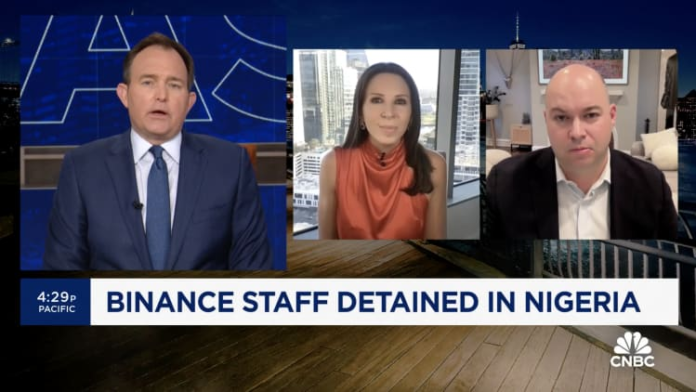The logo of cryptocurrency exchange Binance is displayed on a smartphone, with the word “canceled” on a computer screen in the background.
Budrul Chukrut | SOPA images | LightRocket via Getty Images
One of two Binance executives jailed in Nigeria has escaped custody as the Nigerian government raises new tax evasion allegations against the global cryptocurrency exchange.
Nigeria's Federal Inland Revenue Service (FIRS) announced on Monday that four new charges related to tax evasion have been filed at the Federal Court in Abuja, according to several local media reports.
According to the reports, Binance is being sued for alleged non-payment of value added tax (VAT) and corporate income tax, failure to file tax returns, and complicity in assisting customers to evade taxes through its platform.
In addition to the company, two senior executives – US citizen Tigran Gambaryan and British-Kenyan Nadeem Anjarwalla – were also charged and remanded in custody by Nigerian authorities.
Reports emerged over the weekend that Anjarwalla escaped on Friday from the guesthouse in Abuja where the couple was being held.
“We have been informed that Nadeem is no longer in Nigerian custody. Our primary focus remains the safety of our employees and we are working with the Nigerian authorities to quickly resolve this issue,” a Binance spokesperson told CNBC.
The country is in talks with Interpol to obtain an international arrest warrant for Anjarwalla, Reuters reported, citing Nigeria's national security adviser. The National Security Agency did not immediately respond to a CNBC request for comment.
The families of the two employees declined to comment at this time, but issued statements on March 20 following a hearing at which Nigerian authorities extended their detention.
Anjarwalla's wife, Elahe Anjarwalla, said she was “completely heartbroken” that he would not be home in time to celebrate their son's first birthday.
“Nadeem has no authority to make high-level decisions at Binance and I once again ask the Nigerian authorities from the bottom of my heart to allow him and Tigran to return home while they continue their discussions with Binance. I also call for “The British and Kenyan governments must do more to bring Nadeem home,” she said.
Gambaryan's wife Yuki said she didn't know what to say to her two children about their father's absence.
“Tigran is recognized worldwide for his work in law enforcement and many of his colleagues would say that it is Tigran’s ongoing efforts that ensure cryptocurrencies remain safe and clean,” she said.
“Please let him come home to continue this good work. The longer our husbands are away from our families, the more difficult it becomes for us to go about our daily lives.”
A month in custody
Gambaryan and Anjarwalla were taken into custody in Nigeria on February 26, although neither was charged with a crime at the time. The Abuja government accused its employer of devastating the country's local currency.
The Nigerian Naira is one of the worst-performing currencies in the world, having lost almost 70% its value against the US dollar last year. In recent years, locals have flocked to cryptocurrencies to protect their savings from currency collapse and a soaring inflation rate that reached nearly 30% two months ago.
But Binance's troubles in Nigeria appear to be less about a crackdown on cryptocurrencies and more about an attack on what Abuja sees as a bad actor in the space.
IBADAN, Nigeria – February 19, 2024: Demonstrators are seen during a protest against the rise in prices and harsh living conditions in Ibadan on February 19, 2024.
Samuel Alabi | Afp | Getty Images
Nigeria has raised two main concerns with Binance – the fact that the government does not know where the money is going or how it moves across the exchange, and that the exchange is allegedly allowing speculation on the price of the naira through its peer-to-peer connection Marketplace has made it easier.
The government claimed that Binance was laundering money and that untraceable funds worth $26 billion passed through the exchange.
Authorities in Abuja have also alleged that traders who used this P2P platform to exchange the local currency for US dollar-pegged stablecoins such as Tether colluded on the price to maximize the exchange value. Binance has since shut down its peer-to-peer trading platform in Nigeria.
This is not the first time that Abuja has had problems with Binance. In July 2023, the Nigerian Securities and Exchange Commission issued a circular warning against doing business with the exchange, noting that “any public investor dealing with this company” would do so with “high risk.” “could lead to total loss.” Loss of investments.”
— CNBC's Ruxandra Iordache contributed to this report.

















